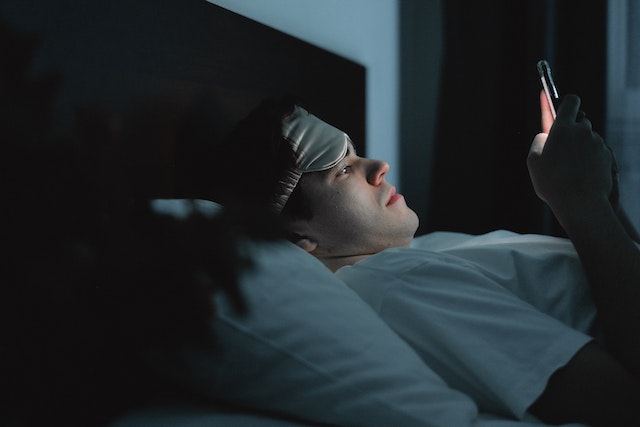
Have you at any point wound up lying in bed, longing for rest, while your brain races through a ceaseless labyrinth of contemplations?
This experience, frequently alluded to as an overactive brain around evening time, can be unquestionably disappointing and baffling.
In this piece, we’ll explore the complexities of why our thoughts seem to heighten when darkness falls, delve into the possible reasons behind this occurrence, and discuss practical approaches to quieting the mind for a peaceful night’s rest.
Understanding an Overactive Brain at Night
The experience of having an active mind when you’re ready to relax and sleep is commonly known as an overactive mind at night.
This occurrence involves an unusual surge of mental energy and alertness during bedtime, which can lead to various manifestations like racing thoughts, a vivid imagination, or heightened awareness of your surroundings.
This restlessness often poses challenges in falling and staying asleep throughout the night.
Understanding and effectively dealing with this phenomenon is pivotal for cultivating healthy sleep patterns and overall well-being.
The Inner Workings of Nighttime Hyperactivity

The role of stress and anxiety
Stress and anxiety, two common culprits that can wreak havoc on our minds, often manifest as an overactive mental state at night.
When the day winds down and external distractions fade away, our minds tend to seize the opportunity to dwell on unresolved worries, unfinished tasks, and nagging anxieties, resulting in a surge of heightened mental activity that can hinder sleep and relaxation.
Unresolved thoughts and worries
As the world settles into quietude during the nighttime hours, our minds are granted the space to delve into the recesses of thoughts that may have been overlooked amidst the day’s busyness.
Amidst the comforting darkness, we’re drawn to ponder the intricacies of our lives—mulling over future aspirations, ruminating on lessons learned from the past, and grappling with the weight of lingering concerns.
In these serene moments, our minds embark on a journey of introspection, intricately weaving together threads of contemplation as we seek understanding and find solace in the embrace of the night.
Digital devices and sleep disruption
The glow of blue light emitted by electronic gadgets, such as smartphones and laptops, can disrupt our sleep patterns.
This is due to the fact that blue light shares a wavelength akin to natural daylight, which tricks the brain into believing it’s daytime, consequently suppressing the production of melatonin—the hormone responsible for regulating sleep.
Engaging with screens before bedtime can rev up brain activity and hinder its shift into sleep mode, potentially causing difficulties in falling asleep and compromising the quality of our rest throughout the night.
The Mind’s Playground: Creative Surges and Nighttime Insights
Interestingly, an overactive mind at night isn’t always negative. In fact, it can be a fascinating experience.
Many highly creative individuals, when the world is quiet and still, find themselves swept away by bursts of inspiration and flooded with novel ideas.
The absence of external stimuli creates a unique environment, akin to a blank canvas, where the mind is free to wander through uncharted territories of imaginative thinking and problem-solving.
It is in these moments of solitude that the true magic of creativity often unfolds, revealing new perspectives and unlocking hidden potential.
In this way, on the off chance that you at any point end up lost in the domain of an overactive psyche around evening time, recall that it tends to be an entryway to a universe of boundless potential outcomes.
Embrace it, investigate it, and let your creative mind take off.

Breaking the Cycle: Strategies to Calm an Overactive Mind
Mindfulness meditation
Mindfulness meditation is centered on consciously guiding your focus to the immediate present while nurturing a non-critical awareness of your thoughts, emotions, and physical sensations.
By engaging in consistent sessions, you can condition your mind to stay rooted in the current moment, offering relief from the constant stream of rapid thoughts that frequently disturb an excessively active mind.
Journaling before bed
Engaging in the practice of writing down your thoughts and worries in a journal before bed can be incredibly therapeutic.
This mindful exercise not only allows you to acknowledge your concerns but also provides a safe space to explore and reflect upon them.
Releasing these thoughts onto paper creates an opportunity to free your mind from the burden of holding onto them throughout the night, promoting a sense of mental and emotional well-being.
Creating a relaxing pre-sleep routine
Engaging in activities imbued with tranquility before the nocturnal hours can act as a signal to your cognitive faculties, heralding the commencement of a phase conducive to winding down and preparing for a night of serene slumber.
One avenue through which you may achieve this state involves the indulgence in literature, wherein a book transports you to realms distinct from your own, granting your thoughts the liberty to meander.
Alternatively, the option of partaking in a tepid bath presents itself, permitting the gentle embrace of the water to cleanse away the burdensome weight of the day’s stressors.
Furthermore, the engagement in delicate stretches assumes a role in liberating any accumulated tension within your musculature, facilitating the promotion of relaxation and an ensuing sensation of serenity.

The Balancing Act: Embracing Nighttime Rest
To strike an optimal equilibrium between nurturing your creative flow and facilitating a peaceful night’s rest, there’s a delicate art to master.
While giving space to your creative musings is essential, finding ways to unwind and relax holds equal importance.
Through the incorporation of relaxation practices, you can expertly guide your mind’s transition from active problem-solving mode to a serene state that’s conducive to profound and revitalizing sleep.
This balanced shift not only fosters your creative capacities but also ensures you awaken invigorated and prepared to conquer the day’s trials ahead.
Conclusion
The secret of an overactive mind around evening time, an interesting peculiarity, can be unwound through a thorough comprehension of the different variables that add to it.
Whether it is the result of heightened stress levels, bursts of creative inspiration that refuse to be ignored, or a mind preoccupied with unresolved worries, the hyperactivity of our thoughts can truly be tamed.
By embracing mindful practices, such as meditation and relaxation techniques, and committing ourselves to nurturing restful sleep with a calming bedtime routine, we can create the ideal conditions for our minds to find peace and tranquility as we drift off into a blissful night’s sleep.
FAQs
Not necessarily. While it can be a symptom of certain sleep disorders, occasional nighttime hyperactivity is a common experience for many individuals.
Yes, caffeine, especially if consumed later in the day, can contribute to an overactive mind at night by stimulating the nervous system.
Yes, a sedentary lifestyle can lead to excess energy that manifests as an overactive mind at night. Regular exercise can help channel this energy and promote better sleep.
The effectiveness of relaxation techniques varies from person to person. Consistent practice over time can lead to noticeable improvements in managing nighttime hyperactivity.
Yes, non-medical strategies such as mindfulness, journaling, and relaxation techniques can be effective in managing an overactive mind at night. If the issue persists, consulting a healthcare professional is advisable.


